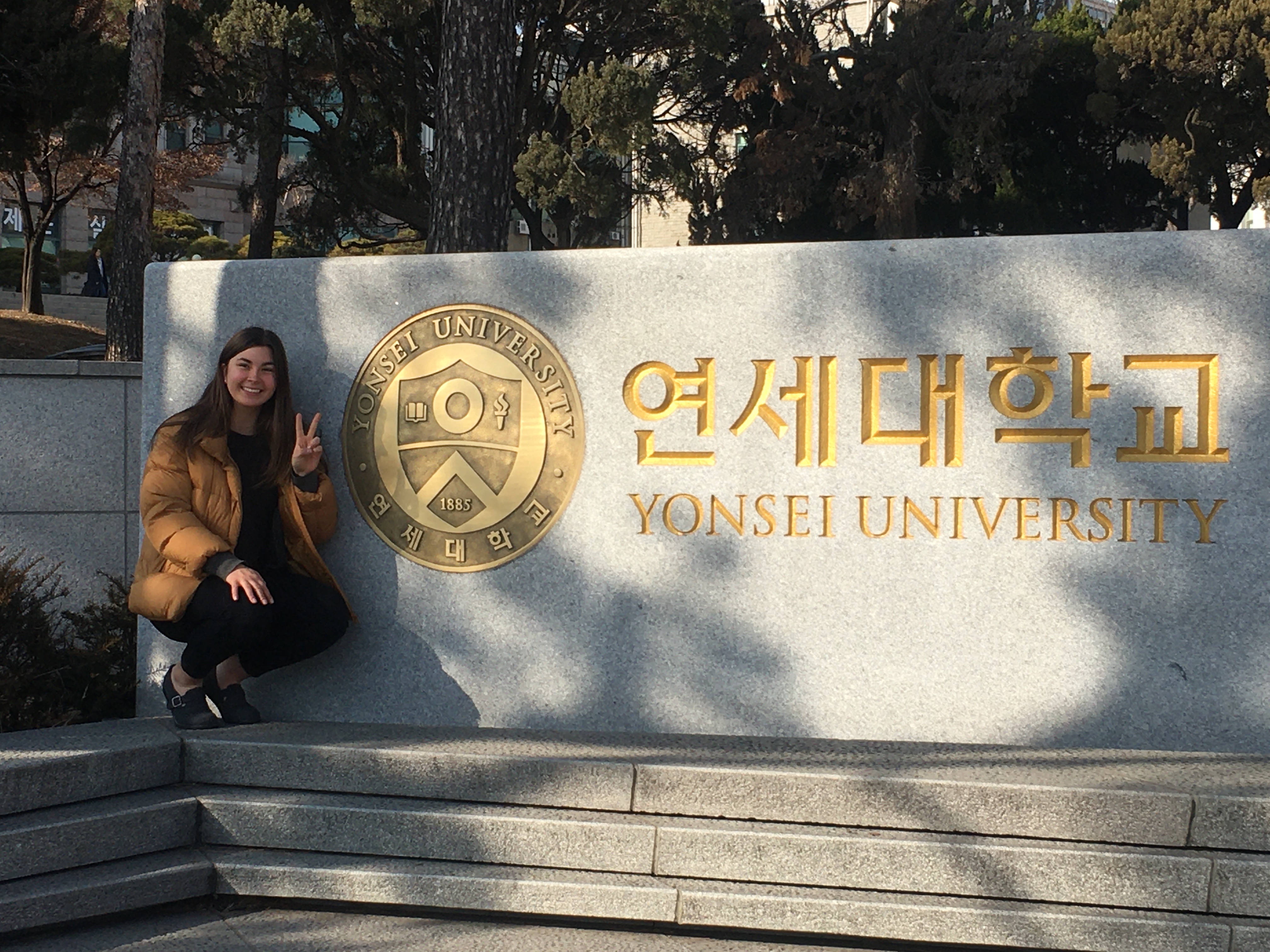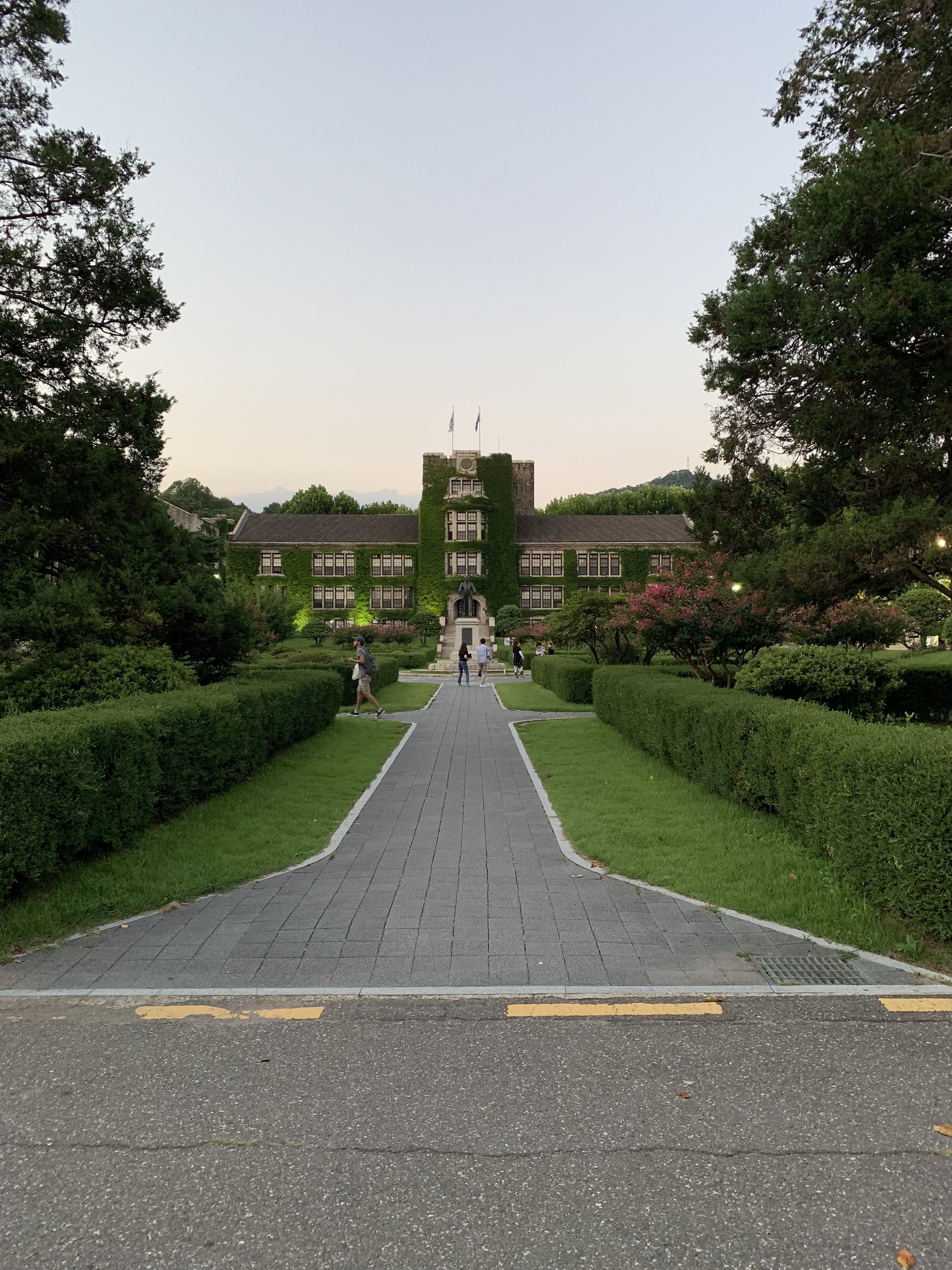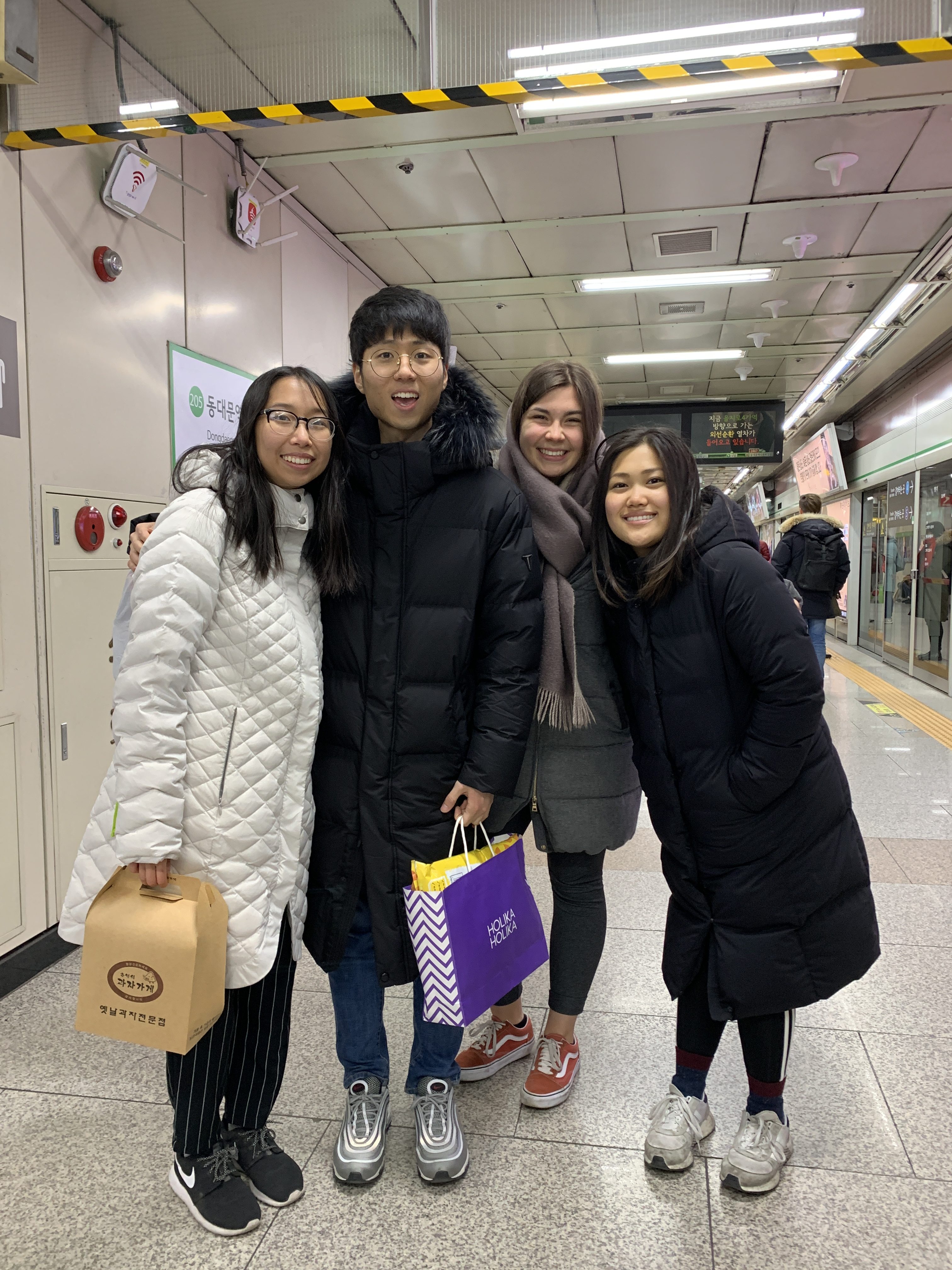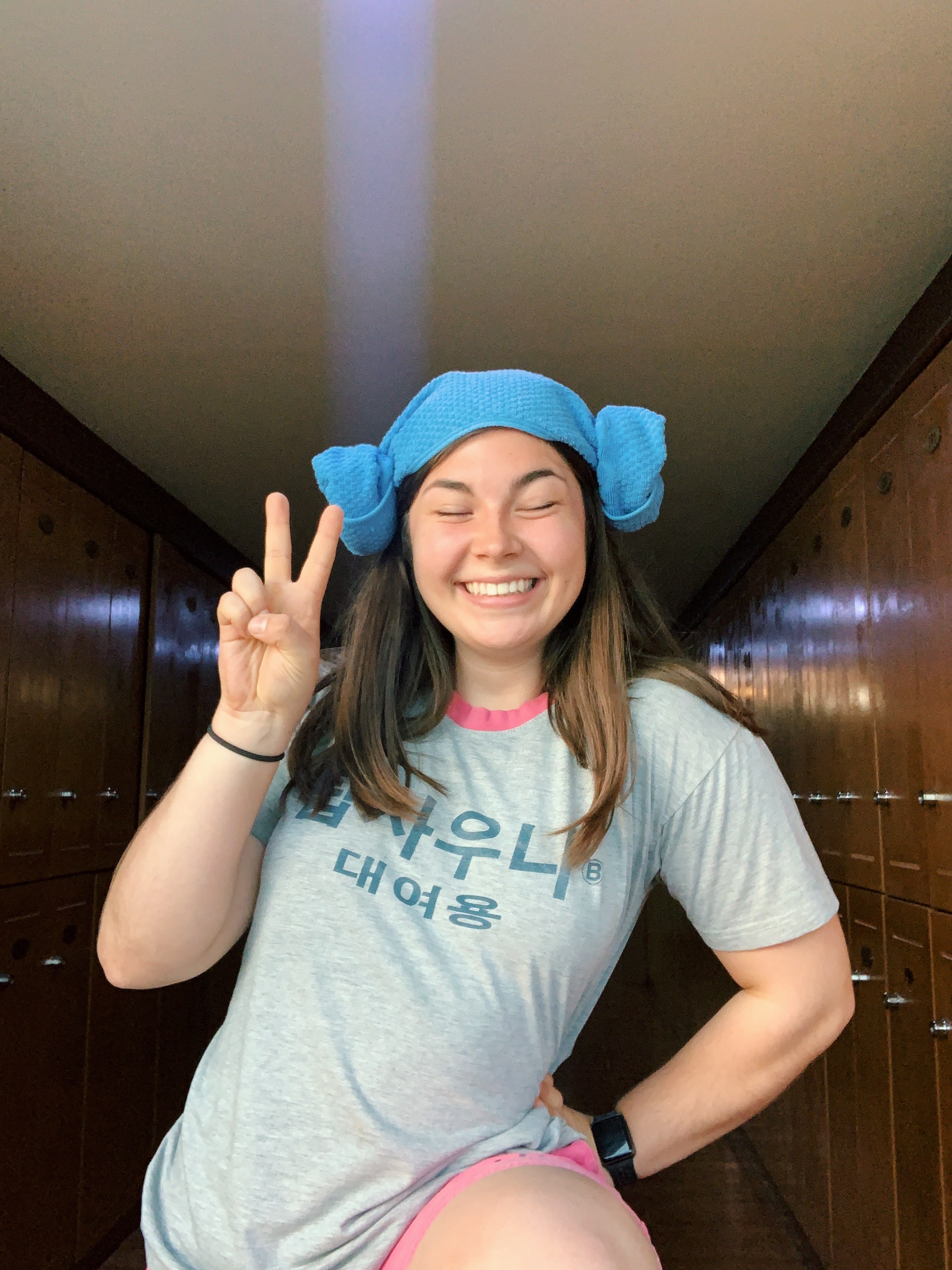Sophie Rock is a 3rd year UBC International Relations student minoring in Korean Language and Culture. Currently, she is on a full-year exchange at Yonsei University in Seoul, South Korea.


How has living in Korea met with your expectations of life there? In what ways has it exceeded it? Anything you didn’t expect or have been particularly challenged by? (Good or bad!)
I made a really concentrated effort to come to Korea with absolutely no expectations – I didn’t want to be discouraged if it didn’t live up to some fantasy I had dreamt in my head. I think many students make the mistake of putting too much pressure on their exchange country to be perfect, and often get let down when they arrive. I also had the luxury of visiting Korea purely for vacation purposes several years ago – and through that experience, I was able to travel around, get a taste of the tourist life, and check most sightseeing boxes. Luckily, this allowed me to move to Korea with a fully “student” mind – that is, with the intention of really living and studying in Korea, rather than having to constantly check a to-do list of sights to see and things to do.
Though I prepared myself for the “busy” lifestyle I was warned of, nothing quite acclimates you to a country than to be thrown right into it. Life here is so much busier and faster-paced than what I am used to in Vancouver. While that inevitably comes with a little more stress and pressure, it also means that there is always something to do. From 6 am sunrise hikes to 2 am chicken delivery, it’s hard to be bored in this city.
Aside from adapting to the new pace of life, pushing outside of the foreigner bubble was also far more difficult than I had expected it to be. I had prepared myself for a month of exclusively foreigner-only hangouts and a lot of English speaking. But that month quickly extended into two and started to grow into a third. If you’re looking to avoid the foreigner bubble, you’ll need to prepare to push yourself often. Of course, it is scary and uncomfortable. But it is all part of the exchange experience! You’re living in this new country, so why not try out your language skills? You’ll inevitably make mistakes, but also, you’ll undoubtedly grow.
(Before the virus hit) – Can you tell us a little about the university you’re attending there? Are there any major differences you’ve found with the students/campus there, compared with UBC?
Yonsei University is a little over 100 years old and certainly has that prestige feel on campus that only comes along with time. Student-wise, Yonsei has around 40,000 students, compared to UBC’s 65,000. Though 40,000 is no small number, attending Yonsei gave me the opportunity to experience a more mid-size university, which was a refreshing change from UBC’s huge student population. Though not quite the same, Yonsei has a lovely Main Mall-esque walkway stretching from one of the oldest buildings on campus right to the main entrance gate. Walking along this stretch you’ll pass by both historic buildings and modern renovations – from the statue of Yonsei’s founder, the busy student cafeteria, and the Samsung Library. Many of the buildings are blanketed in ivy, giving the campus an incredibly green and luscious appearance in spring and summer – truly a breath of fresh air in the middle of busy Seoul. Greenspace is something I have found myself missing while living in Korea. It’s difficult to truly escape the city feel, and at times I find myself pining for a hike down to Wreck Beach to take a break from school-time stress. But, nonetheless, a quick walk around Yonsei’s campus will give you a chance to breathe before heading back into the library (which, did I mention, plays a lovely and soothing piano piece over the loudspeaker five minutes prior to closing? A welcome change from the chilling cowbell awakening at the Koerner Library).


We know you’re also quite the foodie with a love of new and crazy dishes – what’s been your favorite so far?
Hands down, food in Seoul is the best I’ve ever had. Not only is it incredibly cheap and convenient, but it is beyond delicious. While 닭갈비 (dakgalbi) and 찜닭 (jjimdak) are always my go-to’s, I have a special place in my heart for the student cafeteria at Yonsei. From the moment doors open until the last dish is served, the cafeteria is always packed with hungry students, professors, and community members alike. Dishes range from $3.50 – $5.50 CAD and are nutritious, filling, and tasty! I tend to go for the 닭갈비철판볶음 – a stir-fried chicken dish, mixed with sweet potatoes, green onions, rice cakes, and red pepper paste. Though the 순두부찌개 (soft tofu soup) is always a popular choice among the cafeteria-goers.
Likewise, what has been a highlight of your travels there so far?
For me, spending time with the friends I’ve made here consistently tops the list for best experiences. We don’t have to be doing anything special – but enjoying their company is always such a lovely time. Domestic students might think it’s funny, but having them show me their favorite cafes, parks, and neighborhoods is so special. As a foreigner, it’s difficult to avoid the most common and popular places. So having a local student suggest a place to visit has always yielded great experiences. Recently, I met a friend for dinner, and she suggested we bike along the Han River to our restaurant of choice. She knew the way effortlessly and guided me along a busy bike path during sunset. It is such a great memory, the views of Seoul all around me – along with some angry bikers who were not impressed with my relaxed speed.
Notably, it is undeniably difficult to make local friends while abroad. Many of my professors asked me how I was getting along and if I had made any domestic friends – mentioning that it is often a difficult barrier to break through. My suggestion is to find a space you enjoy being in and occupy it frequently. With enough consistency and a little courage on your part, you’re bound to find a genuine friend or two. Notably, it took me almost four months to solidify the friendships I have now, but I am so grateful for all the experiences those friends have given me!


Besides friends and family of course, is there anything you really miss from Canadian life?
The thing I find myself missing the most is greenspace. Especially as spring transitions into summer here in Seoul, I find myself missing the nature of Vancouver quite a bit. From Wreck Beach, Pacific Spirit Park, and the Nitobe Garden – we are so lucky at UBC to have access to so much greenspace. While it exists here in Seoul too, it is difficult to ever feel “outside” of the city. The views at the peak of any hike are of busy Seoul, the pathways next to the Han River are settled next to jammed roads and covered by bridges, and parks to just simply relax in don’t exist in the same way as they do in Vancouver. But of course, this is part of the joy of studying abroad! Why would I want to replicate my home university experience while living in an entirely different country? Certainly, there are things I miss – but I welcome the differences with open arms and am continually grateful for the opportunity to experience new things.
Can you briefly tell us how your daily life has changed since the impact of COVID-19?
I distinctly remember the moment I realized COVID-19 was going to be serious – I was sitting on a stationary bicycle in January, listening to a podcast (alright… I still somehow found a way to work Vancouver life into Seoul) on this new virus that had originated in China. Being in such close proximity to the origin of the virus, I felt a little extra nervous about what might happen. I noticed those around me starting to wear masks more frequently and was constantly being warned about traveling around too much. For a period of time, South Korea was the second-highest infected country with COVID-19, just trailing behind China. That time, for me, was really quite scary. I wasn’t sure what the best course of action was – should I stay in Seoul and hope the virus doesn’t spread? Or should I leave 6 months early to be safe, but miss out on more than half of my exchange? Go Global worked closely with us to ensure we were safe, and ultimately, I decided to stay in Seoul. I made this decision before the virus broke out so severely in North America, and in hindsight, I am extremely grateful to be here in Seoul now.
Of course, daily life has been altered greatly. Most of late January, February, and March were spent indoors, and I was really only leaving my dorm for meals and walks outside. Non-essential gatherings were canceled, as were school-wide events, and other spring-time activities I was looking forward to enjoying. The semester was delayed and moved entirely online, and suddenly – like everyone else – I found myself balancing this very new student experience of Zoom lectures and difficulty feeling like this is really real. Luckily, however, South Korea’s incredibly fast and effective response to the virus means that things are slowly beginning to open back up. The end of April saw the return of most workers back to their offices, the subways once again filled, and more mask-wearing people out and about. Gyms have opened back up, as have small group gatherings, and tourist sights, and it seems as though most people have re-emerged from their homes and are ready to be out and about again.
I cannot stress enough how effective strict social distancing is – I know it is incredibly difficult to be stuck indoors and away from friends and family (believe me – being stuck in a tiny dorm in the middle of a global pandemic, all whilst being in a completely foreign country was as scary and lonely as it gets), but the more strict we are about this distancing, the faster we will be able to overcome the virus and find our new normal.
Anything particular you’d like to tell the Asian Studies Department?
How much I miss you all! For those of you reading, I have had the great pleasure of not only studying under the Department, but also assisting as a Work Learn since my very first day of undergrad. Being able to discuss my travel plans with my professors and coworkers alike helped me a great deal in preparing to live in Seoul. I don’t think I would have been nearly half as prepared if I hadn’t have had the access to so many world travelers. For those of you thinking about traveling abroad, don’t be afraid to ask! You’ll gain a world of knowledge and special tips that will undoubtedly make your time abroad better. And for my friends in the Department: I hope to see you as soon as possible! I hope you’re all staying healthy.


Social Media (if anyone wants to contact!): Instagram: smr37a, Email: smr37a@gmail.com
You can also follow Sophie on YouTube to watch her food and travel experiences!


